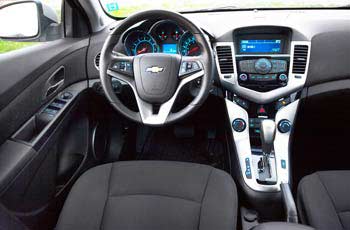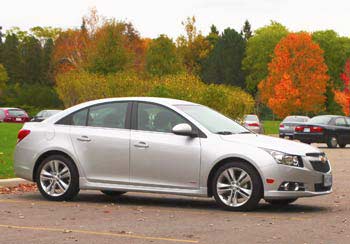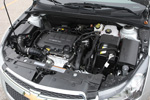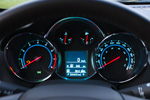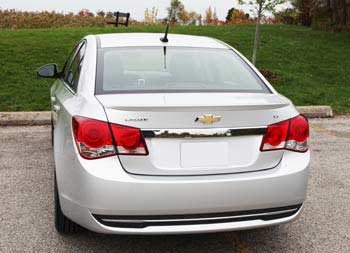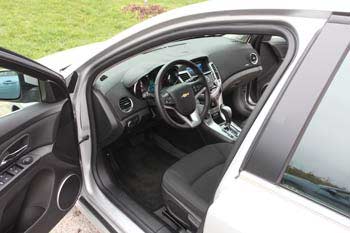Chevrolet Cruze 2011-2015: pros and cons, common problems
By Vlad Samarin. Updated: January 26, 2023
The Chevrolet Cruze is a global car, designed by an international engineering team and sold in 115 countries.
Stylish and roomy,
the Cruze is a big step up from previous GM budget compacts, like the Chevy Cavalier and the Cobalt. Compared to many other compact cars, the Cruze is heavier and offers a more solid feel. It's also one of the safest compact cars.
The Cruze is offered with 1.4L turbo or 1.8L Ecotec engines. The 2.0L Diesel was added for the 2014 model year. What are the pros and cons and common problems? Let's start with pros and cons.
Pros:
- 5-star front and side crash test ratings.
- Affordable prices on the used car market.
- The Cruze has a roomy interior and a large trunk for a compact car.
- Competent handling and comfortable ride.
- The Eco trim with a manual transmission is pretty good on gas.
- Available Diesel engine is rated at 44 highway mpg.
- Easy to work on DIY, many parts are not very expensive.
- Engine and transmission problems, some can be expensive to repair.
- Doesn't hold its value as good as some other compact cars.
- Fabric interior materials are not of top quality.
- Light-colored interior panels scratch easily.
Valve cover, intake manifold: A faulty PCV diaphragm inside the valve cover and missing air check valve in the intake manifold can cause various problems with the engine, including excessive oil consumption, blue smoke from the exhaust, rough idle and Check Engine light. The computer scan may reveal codes P0171, P0106, P1101 and others.
The repair might involve replacing the valve cover and/or the intake manifold. The dealer may charge you up to $900 to replace the intake manifold, valve cover and related parts. Google 'Service Bulletin PIP5197J' for more info. The bulletin is dated October 2018. This forum also has some info. Some owners report changing the valve cover twice. The PCV pipe can go bad too, causing similar issues and the code P1101.
Oil leaks from the valve cover and engine and transmission seals and cooler lines are common.
Coolant leaks: Common sources of coolant leaks include cracks in a coolant expansion tank, coolant outlet valve/housing, thermostat housing, water pump and a radiator. The radiator replacement is costly; the other mentioned parts are not too expensive.
Coolant leaks must be fixed as soon as possible to prevent overheating of the engine, as it can cause more damage. Watch these Youtube videos for more info.
Ignition coils may fail, causing misfiring. Replacing one ignition coil is not very expensive. If the spark plugs are old, it's recommended to replace all the spark plugs at the same time.
The trunk release switch in the trunk can stop working. The repair is not very expensive: replace the switch.
Advertisement
According to GM service bulletin 14311B for the 2011-2015 Chevrolet Cruze, many electrical problems can be caused by a loose negative battery cable. Problems include the display turning off and on, Antilock Brake System, Service Traction System, Service and Steering vehicle messages, etc. The bulletin extends the coverage for this problem. Dealers will replace the negative battery cable.
Transmission issues: Leaking transmission cooler lines are often reported. The problem with this issue is that if the automatic transmission fluid is low, it can cause the transmission to fail sooner. If you notice oil/fluid drops on your driveway, have it checked. Watch these Youtube videos on transmission cooler line replacement.
One of the common problem with the 6T40 automatic transmission is no reverse gear. Repair options include rebuilding the transmission or replacing it with a new or used unit. Used 6T40 transmission are currently sold on eBay for $400-$780 for a unit which is not too bad compared to some other transmissions. Read also: Signs of automatic transmission problems when test driving a used car.
Summary: The Cruze is one of the safest compact cars, and it offers a comfortable, quiet ride. The NHTSA awarded all model years of the first-generation 2011-2015 Chevy Cruze with a 5-star overall crash test rating.
The reliability is not very good, although, judging by the reviews, some owners are happy with their Cruze. We found this video of the 2013 Cruze with a manual transmission with 500K miles! We also know that some of the problems were addressed by GM warranty campaigns and recalls.
As of January 2023, Consumer Reports rates the 2011-2015 Cruze as 'worse than average' for reliability. More reliable compact cars include the Toyota Prius, Corolla, Mazda 3, and Honda Civic.
If you are buying a used Chevy Cruze, consider an extended powertrain warranty that will cover engine/transmission repairs. Make sure the extended warranty contract doesn't have a low claim limit (e.g., $1,000). The Cruze 1.8L engine is less troublesome than the 1.4L turbo. Watch out for leaks.
What to look for when buying a used Chevrolet Cruze: The Cruze was popular with rental car companies; check the history records to see if the car was used as a rental vehicle. Many owners mentioned coolant, oil and transmission leaks, so we would suggest having the vehicle of your choice inspected for leaks and other problems.
One of the symptoms of coolant leaks is a low coolant level in the coolant expansion reservoir and a coolant smell under the hood. Oil leaks from the engine also cause a burnt oil smell from the vents and from under the hood.
During the test drive, watch out for the coolant temperature gauge showing signs of overheating. Overheating the engine can cause many problems. If the service history shows that the engine has been overheated, avoid the car.
Watch out for any warning lights coming on. Issues with the thermostat and the PCV system are often mentioned as the reason for the Check Engine light coming on.
A white smoke from the exhaust, lack of boost and whining noise coming from the front of the engine could indicate a problem with a turbocharger; avoid the car.
Maintenance tips: Turbocharged engines are sensitive to a lack of maintenance; have the oil changed regularly. According to the 2013 Cruze owner's manual, the recommended oil grade is SAE 5W-30, Synthetic Blend.
Coolant leaks are mentioned often; keep an eye on the coolant level and watch out for a coolant smell from under the hood and signs of overheating. Check the engine oil level regularly and top up if needed.
Old spark plugs can cause the engine to misfire and the Check Engine light to come on. Have the spark plugs replaced in recommended intervals or earlier. The owner's manual for the 2015 Cruze recommends replacing spark plugs in the 1.4L engine at 60K miles for severe conditions and 97K miles for normal conditions.
Related reviews:
Chevy Cruze 2016-2019
Mazda 3 2010-2013
Mazda 3 2014-2018
Chevrolet Sonic 2012-2016
Toyota Corolla 2009-2013
Toyota Corolla 2014-2018
Honda Civic 2012-2015
Chevrolet Cruze Engine and Transmission: The base LS model comes with a 138-hp 1.8L engine while the LT, 2LT, ECO and LTZ offer a turbocharged 1.4L motor. For the 2014 and 2015 model years, the 151-hp turbodiesel was added to the 2.0TD and DIESEL trims. A 6-speed manual transmission is available in LS, LT and ECO trims. The most common model in the U.S. is the 1.4-turbo LT with a 6-speed automatic transmission.
Read also: Pros and cons of turbo engines.
Timing belt or Timing chain: The Diesel and 1.8L engine have a timing belt. According to the 2015 owner's manual, for the 1.8L and 2.0L diesel engines, the timing belt, along with the idler pulley and timing belt tensioner (plus the water pump in the diesel engine) must be replaced at 97,500 miles or 156,000 km. Read more: Timing belt: problems, tensioner, what happens if it breaks, when to replace. The 1.4L turbo engine has a timing chain that requires no maintenance during the life of the engine, according to GM.
Fuel Economy: The Cruze diesel gets 27 mpg city and 44 mpg highway, which would make it a great commuter car. The LS 1.8L auto is rated at 24/35 mpg city/highway. The most popular Cruze LT with 1.4L turbo and auto transmission gets 26 mpg city, 36 mpg highway, or about 468 miles (753 km) to a tank.
Chevrolet Cruze Features: The USB port was optional in 2011, 2012; standard from 2013. Cruise control is not available in LS, standard in all other trims from 2012. Bluetooth connectivity was optional in 2011, standard in all models except LS in 2012, standard in all trims from 2013. Only the LTZ trim comes with 18" alloy wheels. The spare tire and the jack were optional for the 2011 Cruze and were not available on some ECO models. If this feature is important to you, make sure the car you want to buy is equipped with a spare tire and jack.
